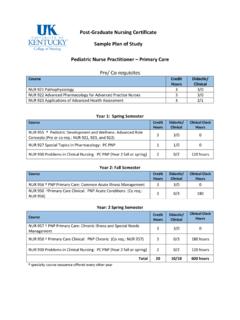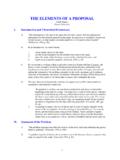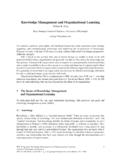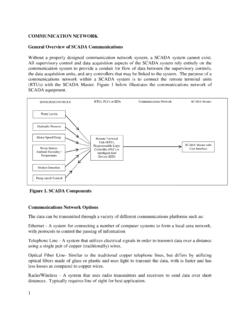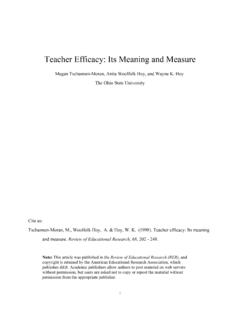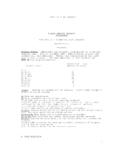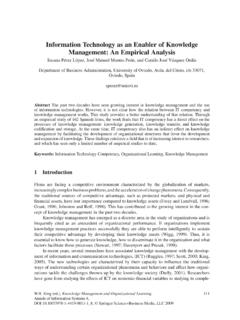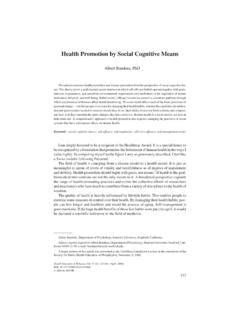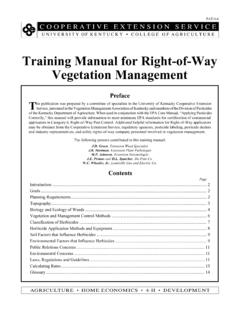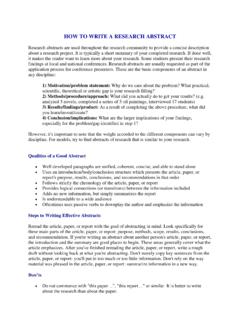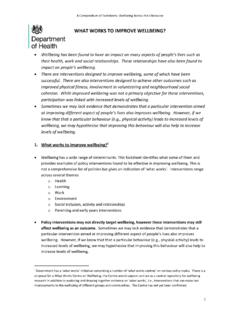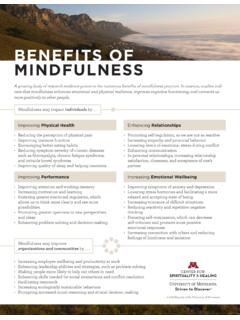Transcription of Health Promotion from the P erspective of Social Cognitive ...
1 1 Health Promotion from the Perspective of Social Cognitive TheoryAlbert BanduraStanford UniversityAbstract This chapter examines Health Promotion and disease prevention from the perspective ofsocial Cognitive theory. This theory posits a multifaceted causal structure in which self-efficacybeliefs operate in concert with cognized goals, outcome expectations, and perceivedenvironmental impediments and facilitators in the regulation of human motivation, action, andwell-being. Perceived self-efficacy is a key factor in the causal structure because it operates onmotivation and action both directly and through its impact on the other determinants. The areasof overlap of sociocognitive determinants with some of the most widely applied psychosocialmodels of Health are identified.
2 Social Cognitive theory addresses the sociostructuraldeterminants of Health as well as the personal determinants. A comprehensive approach to healthpromotion requires changing the practices of Social systems that have widespread detrimentaleffects on Health rather than solely changing the habits of individuals. Further progress in thisfield requires building new structures for Health Promotion , new systems for risk reduction andgreater emphasis on Health policy initiatives. People's beliefs in their collective efficacy toaccomplish Social change, therefore, play a key role in the policy and public Health perspectiveto Health Promotion and disease prevention. Bandura, A. (1998). Health Promotion from the perspective of Social Cognitive and Health , 13, recent years have witnessed major changes in the conception of human Health andillness from a disease model, to a Health model.
3 It is just as meaningful to speak of levels ofvitality as of degrees of impairment. The Health model, therefore, focuses on Health Promotion aswell as disease prevention. Lifestyle habits exert a major impact on the quality of human Health practices focus mainly on the supply side by reducing, rationing, and curtailingaccess to Health care services to contain Health costs. The Social Cognitive approach works on thedemand side by helping people to stay healthy through good self-management of Health exercising control over several Health habits people can live longer, healthier, and slow theprocess of biological aging (Bandura, 1997; Bortz, 1982; Fries, et al., 1993; Fries, 1997). Ashealth economists amply document, medical care cannot substitute for healthful habits andenvironmental conditions (Fuchs, 1974; Lindsay, 1980).
4 Self-management of habits that enhancehealth and reduction of those that impair it is good medicine. Indeed, if the huge benefits of afew key lifestyle habits were put into a pill, it would be declared a spectacular breakthrough inthe field of medicine. Research guided by various psychosocial theories of Health behavior have added to ourunderstanding of how Cognitive and Social factors contribute to human Health and these various approaches are the Health belief model (Becker, 1974; Rosenstock, 1974), Social Cognitive theory (Bandura, 1986, 1997), the theories of reasoned action (Ajzen &Fishbein, 1980), planned behavior (Ajzen, 1991) and protection motivation (Rogers, 1983). Proliferation of conceptual models of Health behavior tends to spawn cafeteria styleresearch.
5 Constructs are picked from various theories and strung together in the name oftheoretical integration. This practice multiplies predictors needlessly in several ways. Similarfactors, but given different names, are included in new conglomerates as though they wereentirely different determinants. Facets of a higher-order construct are split into seeminglydifferent determinants, as when different forms of anticipated outcomes of behavioral change areincluded as different constructs under the names of attitudes, normative influences, and outcomeexpectations. Following the timeless dictum that, the more the better, some researchers overloadtheir studies with a host of factors that contribute only trivially to Health habits because ofredundancy. There is a marked difference between expanding the scope of an integrative theoryand creating conglomerates from different theories with problems of redundancy andfractionation of predictors and theoretical disconnectedness.
6 The present article examines Health Promotion and disease prevention from theperspective of Social Cognitive theory. This theory posits a multifaceted causal structure in whichself-efficacy beliefs operate in concert with cognized goals, outcome expectations, and perceivedenvironmental impediments and facilitators in the regulation of human motivation, action, andwell-being. This approach addresses the sociostructural determinants of Health as well as thepersonal determinants. The factors singled out in the various theories overlap with subsets ofdeterminants in Social Cognitive theory. Figure 1 presents the areas of overlap of the main set ofsociocognitive determinants with those of some of the widely applied psychosocial theories ofhealth behavior.
7 It is acknowledged that these theories differ in their specified range ofapplication. However, they are applied to a variety of Health behaviors and will be consideredbriefly in relation to such applications. Social Cognitive theory in its totality specifies factorsgoverning the acquisition of competencies that can profoundly affect physical and emotionalwell-being as well as the self-regulation of Health Insert Figure 1 about here -----------------------------------Socio Cognitive Causal Structure If people lack awareness of how their lifestyle habits affect their Health , they have littlereason to put themselves through the misery of changing the bad habits they enjoy. They arelectured more than they want to hear about their unhealthy practices.
8 Applications of theories ofhealth behavior have tended to assume adequate knowledge of Health risks. It is usually creates the precondition for change. But additional self-influences are needed toovercome the impediments to adopting new lifestyle habits and maintaining them. Beliefs of personal efficacy occupy a pivotal regulative role in the causal structure ofsocial Cognitive theory (Bandura, 1997). Perceived self-efficacy refers to beliefs in one'scapabilities to organize and execute the courses of action required to produce given levels ofattainments. Although a sense of personal efficacy is concerned with perceived capabilities toproduce effects, the events over which personal influence is exercised varies widely. It mayentail regulating of one's own motivation, thought processes, affective states and behaviorpatterns, or changing environmental conditions, depending on which aspects of life one seeks tomanage.
9 Efficacy belief is a major basis of action. Unless people believe they can produce desiredeffects by their actions, they have little incentive to act or to persevere in the face of difficultiesand setbacks. Whatever else may serve as motivators, they must be founded on the belief thatone has the power to produce desired changes by one s actions. Exercise of control requires not only skills, but a strong sense of efficacy to use themeffectively and consistently under difficult circumstances. Efficacy beliefs not only operate intheir own right. They act on other determinants in the regulation of behavior (Bandura, 1997).Beliefs in one's learning efficacy and efficient deployment of effort enhance acquisition ofknowledge and skills for managing the demands of everyday life.
10 Efficacy beliefs also regulatemotivation by determining the goals people set for themselves, the strength of commitment tothem and the outcomes they expect for their efforts. Belief in the power to produce effectsdetermines how long people will persevere in the face of obstacles and failure experiences, theirresilience to adversity, whether their thought patterns are self-hindering or self-aiding, and howmuch stress and depression they experience in coping with taxing environmental demands. Thebeliefs that people hold about their capabilities, therefore, affect whether they make good or pooruse of the skills they possess. Self- doubts can easily overrule the best of skills. People's beliefs in their personal efficacy can be developed by four main sourcesof influence.
